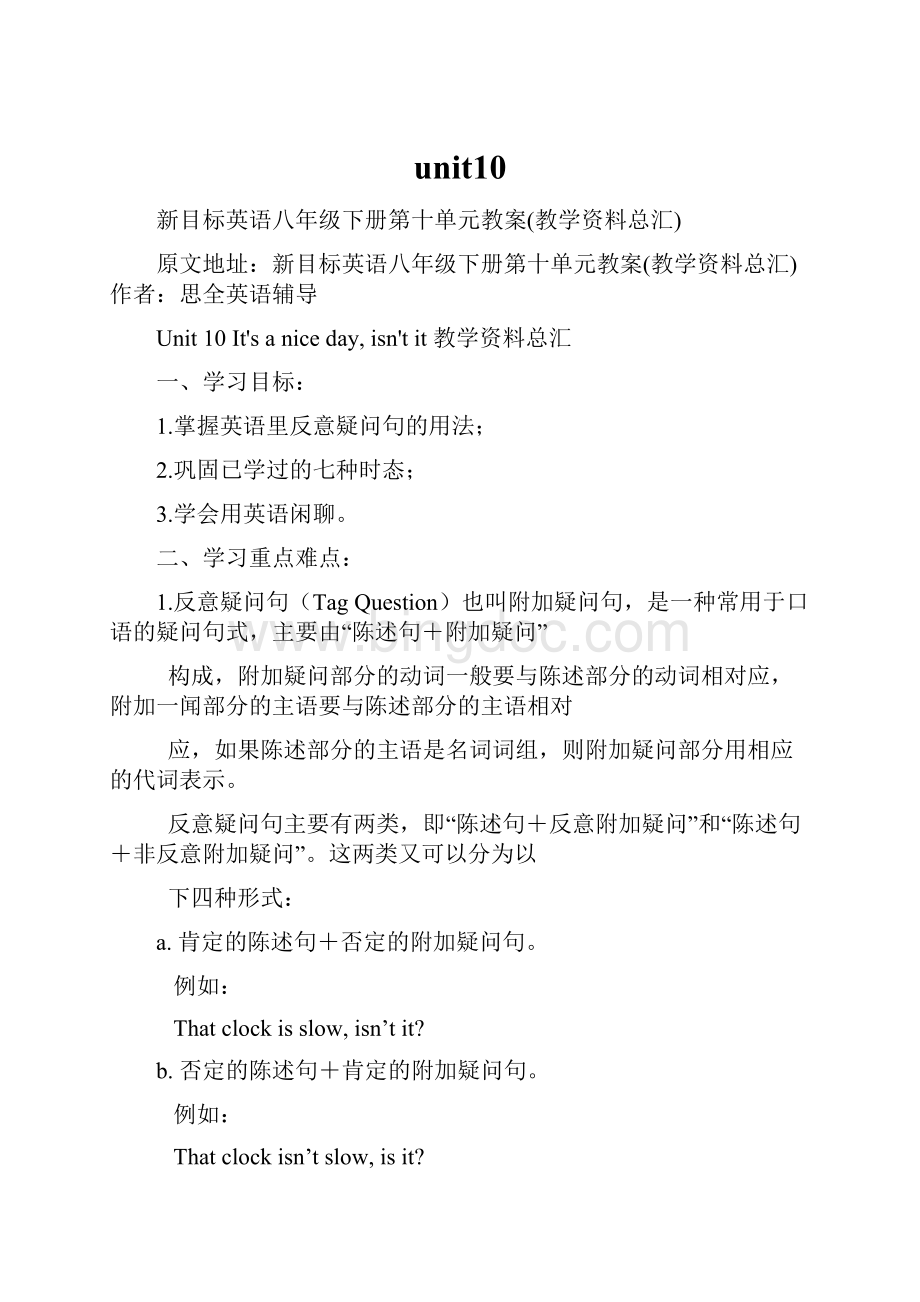unit10.docx
《unit10.docx》由会员分享,可在线阅读,更多相关《unit10.docx(89页珍藏版)》请在冰点文库上搜索。

unit10
新目标英语八年级下册第十单元教案(教学资料总汇)
原文地址:
新目标英语八年级下册第十单元教案(教学资料总汇)作者:
思全英语辅导
Unit10It'saniceday,isn'tit教学资料总汇
一、学习目标:
1.掌握英语里反意疑问句的用法;
2.巩固已学过的七种时态;
3.学会用英语闲聊。
二、学习重点难点:
1.反意疑问句(TagQuestion)也叫附加疑问句,是一种常用于口语的疑问句式,主要由“陈述句+附加疑问”
构成,附加疑问部分的动词一般要与陈述部分的动词相对应,附加一闻部分的主语要与陈述部分的主语相对
应,如果陈述部分的主语是名词词组,则附加疑问部分用相应的代词表示。
反意疑问句主要有两类,即“陈述句+反意附加疑问”和“陈述句+非反意附加疑问”。
这两类又可以分为以
下四种形式:
a.肯定的陈述句+否定的附加疑问句。
例如:
Thatclockisslow,isn’tit?
b.否定的陈述句+肯定的附加疑问句。
例如:
Thatclockisn’tslow,isit?
c.肯定的陈述句+肯定的附加疑问句。
例如:
Thatclockisslow,isit?
d.否定的陈述句+肯定的附加疑问句。
例如:
Thatclockisn’tslow,isn’tit?
前两种形式是主要的,后两种形式使用场合较少。
反意疑问句也可由“祈使句+附加疑问”构成。
例如:
Carrythisboxforme,willyou?
Remembertobuysomemeat,won’tyou?
2.对于我们已经学过的七种时态,这里各举两例:
一般现在时:
Lilylikesgoingshopping,doesn’tshe?
Theyaren’tstudents,arethey?
现在进行时:
You’regoingtothecinema,aren’tyou?
Sheisn’twaitingforme,isshe?
现在完成时:
TheyhavebeentoSingapore,haven’tthey?
Jackhasn’tfinishedhishomework,hashe?
现在完成进行时:
YouhavebeenlivinginBeijingalltheseyears,haven’tyou?
Denishasn’tbeenwatchingTV,hasshe?
一般过去时:
TheyhadagoodtimeatthepartylastSaturday,didn’tthey?
Fannydidn’tgohomelastnight,didshe?
过去进行时:
YouweremakingdinnerwhenIcalled,weren’tyou?
Shewasn’tsleepingatthistimeyesterday,wasshe?
一般将来时:
Wewillhavewonderfulsummerholidays,won’twe?
Theywon’tcomebackuntilmidnight,willthey?
3.关于反意疑问句的构成,有以下几点值得注意:
a.当陈述部分的主语是everybody,everyone,someone,noone,nobody,somebody等指人的合成词时,反意疑
问句的附加部分的主语在正式语体中通常用he。
例如:
Everybodyknowswhathehastodo,doesn’the?
Nobodywantstogothere,doeshe?
Noneoftheboyscandoit,canhe?
在非正式语体中则往往用they。
例如:
NobodyphonedwhileIwasout,didthey?
Everyoneenjoyedtheparty,didn’tthey?
Somebodyborrowedmydictionaryyesterday,didn’tthey?
但若陈述部分的主语是everything,anything,something,nothing等指物的合成词时,反意疑问句的附加部分的主语只能用it。
例如:
Nothingcouldstopthem,couldit?
Everythingisready,isn’tit?
b.当陈述部分是therebe句型时,反意疑问句的附加部分的主语也用there。
例如:
There’snohelpforit,isthere?
There’ssomethingstrange,isn’tthere?
c.陈述部分带有seldom,hardly,never,rarely,few,little,nowhere,nothing等否定词或半否定词是,反
意疑问句的附加部分的动词用肯定形式。
例如:
Fatherrarelygotdrunk,didhe?
Fewpeopleknowhim,dothey?
Sheseldomgoesswimming,doesshe?
如果陈述部分的否定词仅带有否定前缀,那么,该陈述部分作肯定句处理,附加疑问部分一般仍用否定形式。
例如:
Shewasunsuccessful,wasn’tshe?
d.如果陈述部分的主语是I’m…结构,反意疑问句的附加部分一般用aren’tI。
例如:
Iamanadult,aren’tI?
e.如果陈述部分以不定代词one作主语,附加疑问部分的主语在正式场合用one,在非正式场合用you。
例如:
Onecan’tbetoohonest,canone?
Onecan’tbetoohonest,canyou?
f.当陈述部分是一个带有that-分句作宾语的主从结构时,反意疑问句的附加部分一般应与主句的主语和谓语动
词保持对应关系。
例如:
Youthinkyouarehumorous,don’tyou?
Hethinksheisgoingtobecomeanactor,doesn’the?
Shesays(that)Ididit,doesn’tshe?
但是,当陈述部分的主句是Isuppose,Ithink,Ibelieve,Isuspect,Iimagine等结构时,反意疑问句
的附加部分则往往与that-分句中的主语和谓语动词保持对应关系,但要注意否定的转移。
例如:
Isuppose(that)he’sfunny,isn’the?
Idon’tthink(that)shelikesmyclothes,doesshe?
g.在由“祈使句+附加疑问句”构成的反意疑问句中,附加疑问部分一般用willyou,won'tyou,wouldyou。
例如:
Don’tclosethewindow,willyou?
Bequiet,wouldyou?
但是,在以let’s开头的祈使句之后,附加疑问部分用shallwe。
例如:
Let’sgoouttoplaysoccer,shallwe?
Let’shavearest,shallwe?
以letus开头的祈使句,含义是allowus,不包括听话人在内,因此反意疑问句的附加部分用willyou。
例如:
Letusstopnow,willyou?
Letushavealookatyourbook,willyou?
4.反意疑问句的回答方式和一般疑问句一致,根据事实来回答。
注意当陈述部分是一个否定句时,英文的回答方
式和中文的回答方式有差别。
例如:
Sheisabeautifulgirl,isn’tshe?
她是个漂亮的姑娘,不是吗?
Yes,sheis. 是的,她是。
No,sheisn’t. 不,她不是。
Youdon’tlikeonions,doyou?
你不喜欢洋葱,是吗?
Yes,Ido. 不,我喜欢。
No,Idon’t. 是的,我不喜欢。
强化练习:
一、请在下面的空格中填入适当的附加疑问句:
1.Maryhastogohomenow,___________?
2.That’syourtwinbrother,___________?
3.There’snothingwrong,___________?
4.Jackhadatalkwithhisfather,___________?
5.Onecan’tbetoocareful,___________?
6.Givemeahand,___________?
7.Hewascleaninghishousealldayyesterday,___________?
8.Nothingcanstopusnow,___________?
9.Anyonecangototheparty,___________?
10.Theywon’tbereadytillnextyear,___________?
11.Iamnottheoneyou’rethinkingabout,___________?
?
12.Let’sgocamping,___________?
13.Youhaven’tfoundoutwhodidit,___________?
14.Isupposeyouknowthepassword,___________?
15.Emilyrarelystaysoutlate,___________?
二、根据所给中文释义完成句子,每空一词。
1.你去过游乐场,不是吗?
Youhavebeento__________________,____________?
是的,我去过两次。
Yes,Ihavebeenthere______.
2.麦克每个月都理发,不是吗?
Mike______hishair______everymonth,____________?
不,他两周理一次发。
No,he______hishair_________________________.
3.我没告诉你他已经回来了,是吗?
Ididn’ttellyouhe___________________,_____________?
不,你告诉过我了。
No,you____________me.
4.詹妮没有你大,是吗?
Jennyisn’t__________________you,____________?
是的,她没有我大。
______,____________.
参考答案:
一、
1.doesn’tshe?
2.isn’tit?
3.isthere?
4.didn’the?
5.canone?
(canyou)
6.won’tyou?
(willyou?
)
7.wasn’the?
8.canit?
9.can’the?
(can’tthey?
)
10.willthey?
11.aren’tI?
12.shallwe?
13.haveyou?
14.doyou?
15.doesshe?
二、
1.an,amusement,park,haven’t,youtwice
2.has,cut,doesn’t,hehas,cut,every,two,weeks(has,cut,every,other,week)
3.has,come,back,did,Ihave,told
4.as,old,as,is,sheNo,she,isn’t
Title
It’saniceday,isn’tit?
Topic
Smalltalk
Functions
Makesmalltalk
Structures
Tagquestions
Targetlanguage
It’saniceday,isn’tit?
Yes,itis.Ireallylovehotweather.
You’reJenny’sfriend,aren’tyou?
Yes,Iam.
Vocabulary
Umbrella,smalltalk,thank-younote
Recycling
Weather,hot,cold,rain,great,train,bus,party,hobby,violin,tennis,hockey,beach
LearningStrategies
Cooperating
Usingwhatyouknow
Ⅰ.WordsandExpressions:
(n.名词 adj.形容词 adv.副词 v.动词 prep.介词)
单词/短语
词性
词义
讲解与例句
rain
n.
雨;下雨
Therewasraininthenight. 夜里下雨了。
umbrella
n.
雨伞
Takeanumbrella—it'sgoingtorain.
带上伞吧,要下雨了。
ontheweekend
在周末
Whatareyougoingtodoontheweekend?
你周末打算做什么?
openingquestion
开场白
Heropeningquestionisexcellent.
她的开场白很棒。
bookstore
n.
书店
Hewenttothebookstoreandboughtsomebooksyesterday.他昨天去书店买了些书。
alone
adv.
单独地;独自地
Shelivedalone. 她独居。
Thekeyalonewillopenthedoor.
只有这把钥匙能开这个门。
Hediditallalone.这事是他一个人干的。
cross
v.
穿过;横过
Theycrossedtheroad. 他们过了马路。
Wecrossedeachotherontheway.
我们在途中错过了。
cost
v.
价值;花
Howmuchdidthatbagcost?
那个书包要多少钱?
Yourcrimewillcostyouyourlife.
你的罪行将使你失去生命。
helpwith
在某方面帮助
HehelpsmewithmyEnglish.
他帮我学英语。
getalong
融洽相处
Doyougetalongwithyouclassmates?
你和同学相处融洽吗?
traffic
n.
交通;交通量
Trafficpolicearesometimesverypolite.
交通警察非常有礼貌。
Thecitystreetsarefulloftraffic.
城市的街道上满是行人车辆。
atleast
至少;最少
He'sgoingawayforatleastaweek.
他起码一星期出去一次。
Ⅱ.SentencesandPhrases(句型与词组)
GrammarFocus
It’sreallywindytoday,isn’tit?
Yes,itis.
You’reBen’ssister,aren’tyou?
Yes,Iam.
TheM-15busstopshere,doesn’tit.
Yes,itdoes.
本单元的重点是反意问句。
陈述句后面的反意问句的用法:
1.反意问句一般由“助动词+人称代词”构成,用在句末,要求对方确认一些我们不敢肯定的事情,或要求对方表示赞同,含有“这是真的吗?
”或“你同意吗?
”的意思。
e.g
Itisverycoldtoday,isn’tit?
Wehadmuchtime,hadn’twe?
Thereisalittlewaterinthecup,isn’tthere?
Thereislittlewaterinthecup,isthere?
2.陈述句的动词若是肯定,反意问句的动词要用否定,反之,就用肯定。
Mrs.SmithlivesinItaly,doesn’tshe?
ShecanhardlyspeakGerman,canshe?
ShehasfewfriendsinGermany,has(does)she?
Thereisn’tanybodyathome,isthere?
3.陈述句与反意问句里的动词时态要相同。
ShehadtogotoFranceeveryspring,didn’tshe?
Therewaslittlewaterinthecup,wasthere?
4.陈述句与反意问句的主语必须指同一人或同一事物。
Sheneedstohaveitrepaired,doesn’tshe?
Youhadbettergoalone,hadn’tyou?
5.陈述句的主语不论属于何种词类,反意问句的主语一定要用人称代词。
Thoseareyourfriends,aren’tthey?
Shehasn’tfinishedherhomework,hasshe?
6.陈述句的动词为have,has,had,但不作“有”解时,反意问句的主语之前不可用have,has,had,而改
用do,does,did.
Youhavenothingtosay,doyou?
YouhaveJohndothework,don’tyou?
7.含有seldom;hardly;few;little;never;rarely等词的句子,被认为是否定句。
e.g.
Heseldomcamehere,didhe?
Fewpeopleknewtheanswer,didthey?
Noneofusknewtheway,didwe?
Wehadn’tmuchtime,hadwe?
Littleprogresshasbeenmade,hasit?
Wecouldhardlyhearwhatshesaid,couldwe?
Weseldomseethemnow,dowe?
Onecan’tbetoocareful,canone?
8.nobody,none,noone,anybody,anyone,everybody,everyone等不定代词作主语时,其反意问句通常用they作主语。
e.g.Everybodycame,didn’tthey.
祈使句后面的反意问句的用法:
1.由let’s引出的祈使句,肯定的用shallwe?
否定的用allright?
或O.K.?
e.g.
Let’sstartearly,shallwe?
Let’snotgofishing,allright(O.K.)?
--Let’sgodancing,shallwe?
--Allright.
2.肯定祈使句之后,表示“请求”,用willyou?
表“邀请,劝诱”用won’tyou?
e.g.
Letushavealook,willyou?
--Passmethedictionary,willyou?
--Yes,withpleasure.
Havesomecoffee,won’tyou?
Becarefulwhenyoucrosstheroad,won’tyou?
3.否定祈使句之后,表示“请求,则只用willyou?
”
e.g.
Don’topenthewindow,willyou?
语法点概述
一、
1.Wouldyoumind...?
(1)Wouldyoumind+v.-ing...?
用来客气地提出请求。
例如:
Wouldyoumindgivingmeaglassofwater?
请给我一杯水好吗?
Wouldyoumindcleaningyourroom?
你可以打扫你的房间吗?
I’msorry.I’lldoitrightaway.
对不起,我马上就做。
Wouldyoumindnotplayingbaseballhere?
你可以不在这里打棒球吗?
Sorry,we’llgoandplayinthepark.
对不起,我们将会去公园里玩。
(2)Wouldyoumind+sb.’s+v.-ing...?
用来提出询问,征求对方的意见(在非正式文体中,v.-ing前的所有格可换为宾格)。
例如:
Wouldyoumindmysmokinghere?
我在这里抽烟你介意吗?
Yes,you’dbetternot.是的,你最好别抽。
No,certainlynot.不介意,你当然可以抽。
回答带有mind的问句时要注意yes或no都是针对min